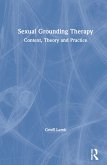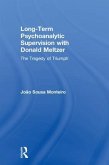- Gebundenes Buch
- Merkliste
- Auf die Merkliste
- Bewerten Bewerten
- Teilen
- Produkt teilen
- Produkterinnerung
- Produkterinnerung
This book aims to present an up-to-date introduction and critical study of one of the most important psychoanalysts of all times, Sándor Ferenczi.
Andere Kunden interessierten sich auch für
![Reading Michael Balint Reading Michael Balint]() Helene Oppenheim-GluckmanReading Michael Balint219,99 €
Helene Oppenheim-GluckmanReading Michael Balint219,99 €![The Psychoanalyst's Superegos, Ego Ideals and Blind Spots The Psychoanalyst's Superegos, Ego Ideals and Blind Spots]() Vic SedlakThe Psychoanalyst's Superegos, Ego Ideals and Blind Spots150,99 €
Vic SedlakThe Psychoanalyst's Superegos, Ego Ideals and Blind Spots150,99 €![Sexual Grounding Therapy Sexual Grounding Therapy]() Geoff LambSexual Grounding Therapy170,99 €
Geoff LambSexual Grounding Therapy170,99 €![The Emergence of Analytic Oneness The Emergence of Analytic Oneness]() Ofra EshelThe Emergence of Analytic Oneness160,99 €
Ofra EshelThe Emergence of Analytic Oneness160,99 €![Child and Adolescent Psychotherapy Child and Adolescent Psychotherapy]() Peter BlakeChild and Adolescent Psychotherapy170,99 €
Peter BlakeChild and Adolescent Psychotherapy170,99 €![Ferenczi on Freud's Couch Ferenczi on Freud's Couch]() Yves LugrinFerenczi on Freud's Couch170,99 €
Yves LugrinFerenczi on Freud's Couch170,99 €![Long-Term Psychoanalytic Supervision with Donald Meltzer Long-Term Psychoanalytic Supervision with Donald Meltzer]() João Sousa MonteiroLong-Term Psychoanalytic Supervision with Donald Meltzer170,99 €
João Sousa MonteiroLong-Term Psychoanalytic Supervision with Donald Meltzer170,99 €-
-
-
This book aims to present an up-to-date introduction and critical study of one of the most important psychoanalysts of all times, Sándor Ferenczi.
Hinweis: Dieser Artikel kann nur an eine deutsche Lieferadresse ausgeliefert werden.
Hinweis: Dieser Artikel kann nur an eine deutsche Lieferadresse ausgeliefert werden.
Produktdetails
- Produktdetails
- Verlag: Taylor & Francis
- Seitenzahl: 138
- Erscheinungstermin: 11. Februar 2022
- Englisch
- Abmessung: 203mm x 127mm x 10mm
- Gewicht: 263g
- ISBN-13: 9780367426750
- ISBN-10: 0367426757
- Artikelnr.: 62571339
- Herstellerkennzeichnung
- Libri GmbH
- Europaallee 1
- 36244 Bad Hersfeld
- gpsr@libri.de
- Verlag: Taylor & Francis
- Seitenzahl: 138
- Erscheinungstermin: 11. Februar 2022
- Englisch
- Abmessung: 203mm x 127mm x 10mm
- Gewicht: 263g
- ISBN-13: 9780367426750
- ISBN-10: 0367426757
- Artikelnr.: 62571339
- Herstellerkennzeichnung
- Libri GmbH
- Europaallee 1
- 36244 Bad Hersfeld
- gpsr@libri.de
Alberto Fergusson, M.D., is a psychiatrist and psychoanalyst working in Colombia and in the United States. Since 1982, he has been the head and founder of the Institute of Accompanied Self-Rehabilitation. He was also the Founder of FUNGRATA in Colombia and FAS in Washington DC. He is currently Director and Full Professor at the Center for Psychosocial Studies (CEPPS) of the Universidad del Rosario, Colombia. He has been actively involved in the peace process in Colombia, at present as advisor to the president of the Truth Commission. Miguel Gutiérrez-Peláez, Ph.D., is a Full Professor at the Center for Psychosocial Studies (CEPSS) of the Universidad del Rosario, Colombia and has been part of the Psychology Program since 2011. He is a member of the World Association of Psychoanalysis (AMP) and the New Lacanian School (NEL) and has his clinical practice in Colombia. He is author of the book Confusion of Tongues. A Return to Sándor Ferenczi (Routledge, 2018).
Introduction
1. The democratization of psychoanalysis. Sándor Ferenczi, from forced disappearance to resurrection
2. Sándor Ferenczi's biographical outline
3. Ferenczi's encounter with psychoanalysis
4. Ferenczi as a translator and divulgater of Freud's work
5. The concept of "Introjection"
6. Ferenczi's introduction of technical innovations
7. Thalassa and Bioanalysis
8. The end of analysis
9. Ferenczi's interest in the psychology of the child: upbringing and education
10. Ferenczi's latest writings. The effect of "confusion of tongues" and his Clinical Diary
11. Ferenczi's trauma theory
12. Splitting as a psychic defence
13. The repression of Ferenczi's work and the return of the repressed
14. Ferenczi's legacy and place in the world today
15. What is the relevance of Ferenczi in the future?
Epilogue
References
1. The democratization of psychoanalysis. Sándor Ferenczi, from forced disappearance to resurrection
2. Sándor Ferenczi's biographical outline
3. Ferenczi's encounter with psychoanalysis
4. Ferenczi as a translator and divulgater of Freud's work
5. The concept of "Introjection"
6. Ferenczi's introduction of technical innovations
7. Thalassa and Bioanalysis
8. The end of analysis
9. Ferenczi's interest in the psychology of the child: upbringing and education
10. Ferenczi's latest writings. The effect of "confusion of tongues" and his Clinical Diary
11. Ferenczi's trauma theory
12. Splitting as a psychic defence
13. The repression of Ferenczi's work and the return of the repressed
14. Ferenczi's legacy and place in the world today
15. What is the relevance of Ferenczi in the future?
Epilogue
References
Introduction; 1. The democratization of psychoanalysis. Sándor Ferenczi, from forced disappearance to resurrection; 2. Sándor Ferenczi's biographical outline; 3. Ferenczi's encounter with psychoanalysis; 4. Ferenczi as a translator and divulgater of Freud's work; 5. The concept of "Introjection"; 6. Ferenczi's introduction of technical innovations; 7. Thalassa and Bioanalysis; 8. The end of analysis; 9. Ferenczi's interest in the psychology of the child: upbringing and education; 10. Ferenczi's latest writings. The effect of "confusion of tongues" and his Clinical Diary; 11. Ferenczi's trauma theory; 12. Splitting as a psychic defence; 13. The repression of Ferenczi's work and the return of the repressed; 14. Ferenczi's legacy and place in the world today; 15. What is the relevance of Ferenczi in the future?; Epilogue; References
Introduction
1. The democratization of psychoanalysis. Sándor Ferenczi, from forced disappearance to resurrection
2. Sándor Ferenczi's biographical outline
3. Ferenczi's encounter with psychoanalysis
4. Ferenczi as a translator and divulgater of Freud's work
5. The concept of "Introjection"
6. Ferenczi's introduction of technical innovations
7. Thalassa and Bioanalysis
8. The end of analysis
9. Ferenczi's interest in the psychology of the child: upbringing and education
10. Ferenczi's latest writings. The effect of "confusion of tongues" and his Clinical Diary
11. Ferenczi's trauma theory
12. Splitting as a psychic defence
13. The repression of Ferenczi's work and the return of the repressed
14. Ferenczi's legacy and place in the world today
15. What is the relevance of Ferenczi in the future?
Epilogue
References
1. The democratization of psychoanalysis. Sándor Ferenczi, from forced disappearance to resurrection
2. Sándor Ferenczi's biographical outline
3. Ferenczi's encounter with psychoanalysis
4. Ferenczi as a translator and divulgater of Freud's work
5. The concept of "Introjection"
6. Ferenczi's introduction of technical innovations
7. Thalassa and Bioanalysis
8. The end of analysis
9. Ferenczi's interest in the psychology of the child: upbringing and education
10. Ferenczi's latest writings. The effect of "confusion of tongues" and his Clinical Diary
11. Ferenczi's trauma theory
12. Splitting as a psychic defence
13. The repression of Ferenczi's work and the return of the repressed
14. Ferenczi's legacy and place in the world today
15. What is the relevance of Ferenczi in the future?
Epilogue
References
Introduction; 1. The democratization of psychoanalysis. Sándor Ferenczi, from forced disappearance to resurrection; 2. Sándor Ferenczi's biographical outline; 3. Ferenczi's encounter with psychoanalysis; 4. Ferenczi as a translator and divulgater of Freud's work; 5. The concept of "Introjection"; 6. Ferenczi's introduction of technical innovations; 7. Thalassa and Bioanalysis; 8. The end of analysis; 9. Ferenczi's interest in the psychology of the child: upbringing and education; 10. Ferenczi's latest writings. The effect of "confusion of tongues" and his Clinical Diary; 11. Ferenczi's trauma theory; 12. Splitting as a psychic defence; 13. The repression of Ferenczi's work and the return of the repressed; 14. Ferenczi's legacy and place in the world today; 15. What is the relevance of Ferenczi in the future?; Epilogue; References









